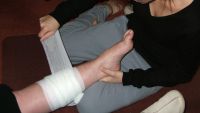



FACT: As an employer, you must provide adequate and appropriate first-aid equipment, facilities and personnel to ensure your employees receive immediate attention if they are injured or taken ill at work.
The Health & Safety (First Aid) Regulations 1981 does require you to provide adequate first aid cover and this includes first aid supplies, people and equipment, but how do you know if you need an;
and does this need to be over 1, 2 or 3 days (did there not used to be 4 and even 5-day courses)?
In broad terms there are now 3 courses (see above. The Appointed person course was to all intents and purposes replaced in 2008 by the 1 day EFAW course by most companies) which broadly come under the banner of workplace first aid in the UK.
This, however, does not include other specialist subjects including (but not restricted to) paediatric first aid, Forestry first aid, Defibrillator (AED) training, Anaphylaxis and training, which can include a number of specific duties and requirements dependant on job type.
An Emergency first aider (EFAW) is a person who has been trained over a minimum of 6 hours, and this allows the first aider to give emergency first aid to someone who is injured, or becomes ill at work.
Full First Aid at Work (FAW) training covers the same syllabus, but is run over a minimum of 3 days (1 18 hours) and includes much more specific injuries such as; treatment of fractures, specific serious wounds and conditions such as Cerebro-Vascular-Accidents (CVA) or strokes, along with other such conditions including anaphylaxis, skull fractures, concussion, spinal injury management and much more.
The 2 day Re-Qualification First aid at Work (RFAW) covers the same syllabus as the 3 day FAW course, but is only open to current FAW first aiders nearing the end of their existing certification, and covers all the subjects contained within the 3 day course, although condensed, with much more student-centred learning.
Where however, an employer considers that they don’t need a first aider for the workplace, they can appoint someone to look after first aid arrangements. This includes looking after the first aid boxes and equipment and calling the emergency services if required. In reality, this role has largely been discontinued since the advent of the EFAW courses when they were introduced in 2008.
To find out more, contact First Aid Scotland on 0800 0431 327, or 0141 248 4969 for more information.

As an employer, you will need re-assurances that the company you choose to provide first aid is competent and qualified
First-aid training is available from a wide range of training providers.
These include:
As an employer, you will need assurance that you have selected an appropriate training provider. You will, therefore, need to check that they meet the standards in a number of areas (due diligence). All training providers should be prepared to demonstrate that they: